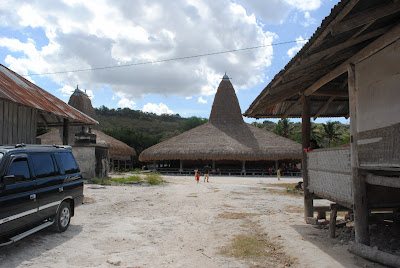WAINGAPU, SUMBA
Well here we are on Sumba. This is a large island compared to the others, covering 7000 sq. km. Population approx. 360,000. Sumba is certainly more prosperous than its neighbours. Big rivers flow throughout supplying water for irrigation of rice paddies and vegetable gardens. The town of Waingapu is the most modern we have seen to date, although there are still many poor areas. And like every other pace we have been to in Indonesia there is rubbish everywhere. There is no rubbish collection so it is either burnt or dumped. Most places are clean, but they just move the rubbish off their bit of land onto next door or out into the street.
Not only the streets are littered with rubbish, so is the harbour. Bags of rubbish come up on our anchors, and we were unfortunate enough to snag a gigantic admiralty or fishermans anchor on our first attempt to anchor. Reckon it could have been the original one from Captain Cook it was that big. Two of the others came over to help, and it took them nearly an hour to clear it. It is now sitting on the bottom waiting to snare some other poor bugger.
Once again the hospitality here is overwhelming. Because we were here early we were invited to the celebrations for Indonesian Independence Day. Apparently on the 17th august 1945 they declared their independence. It took another two years before the Dutch left.
There was a military flag raising ceremony in the morning, followed by very serious competitions of tug-of-war and another where the kids try to climb a bamboo pole covered in grease. There are all sorts of kitchen utensils tied to the top on a wheel, but the big prize is the Indonesian flag on top. It is worth 1 million rupiah for the person who manages to get it. That equates to about $133.00 which is two months wages here.
FLAG RAISING CEREMONY
We were very much honored guests. We were escorted to the front row alongside the big brass from Navy, Army, Police, Swat teams, and Special Service police. Behind us were the civil servants upper echelon, all wondering where we fit into the picture. We were even supplied with a morning tea snack, along with copious amounts of water.
CLIMBING THE POLE
We returned to our boats for the rest of the day, and presented ourselves on the wharf at 7.00 pm for the gala dinner. Lots of speeches in Indonesian, then dinner which is buffet style. Don't get between an Indonesian and a free feed let me tell you. The chickens here are very scrawny, but must have long necks as that seems to be a favourite: all bone and no meat. And HOT. Those little lombok (chilies ) are dynamite and used in nearly everything.
TRADITIONAL VILLAGE
On friday there was a bus tour to Pau, a traditional village where the ikat are woven. Everywhere we went we were mobbed by ladies trying to sell us their ikats. Gets very tiring after the first couple. And if you buy one that only seems to encourage the others to hassle you. It was very interesting to see how they are made, it is a very slow and painstaking process, first hand spinning the cotton, then tie-dieing the yarn and then weaving it thread by thread.
WEAVING THE IKAT
Then it was off to another village with gravestones. The last king died 3 years ago and is buried here. While most are Christian with a small percentage of Muslims, up in these villages many still hold firmly to the old religion called Marapu in their daily lives.
Traditionally when a king dies his body is kept until his grave is ready. This can take a few years as monolithic stones must be manually hauled from outside the village to be used as a tombstone. Once the tomb is ready, then the sacrificing begins. Horses and buffalo are offered up, and implements are sent with the person for use in the next life.
But here is where it gets interesting. The king has slaves and some of them must accompany him on his journey. Yep!! You got it. The slave or slaves are sacrificed as well. They get a little round stone for their gravestone. When we asked about the custom they readily agreed that that is the way it used to be. When we said that of course that didn't happen when the last king died 3 years ago they just looked at us and said nothing. Would not answer the question. Very sobering thought.
A KINGS TOMB
Then it was off to another village for a welcome dance, and the offering of betel nut. This is a sign that you are welcome in their village. Betel nut chewing is very big here. It is terrible. It is a mind altering drug, obviously gives them a high, stains their teeth red so they rot away and then they spit everywhere. At least it is stained red so you can avoid stepping in it.
A SUMBANESE DANCER
ANOTHER DANCER
Well that was Sumba, very generous and helpful but we have been here a week so time to move on. Next report from Rindja and Komodo where the dragons are.








1 comment:
Hi you two. Looks fantastic. Great experience. We re in McKay for a couple. Then a little north. All good. Marg and Brian - a la Vagabond.
Post a Comment